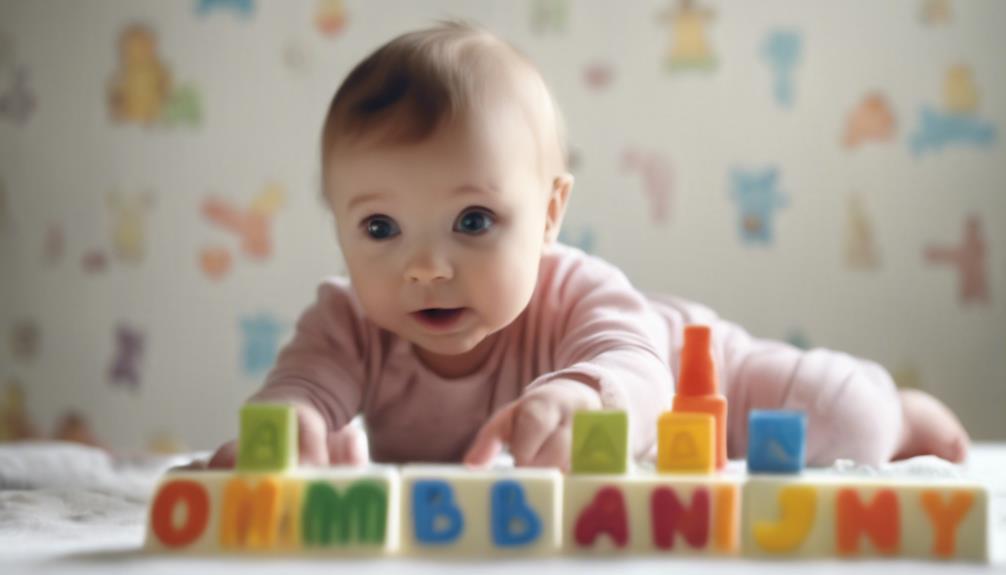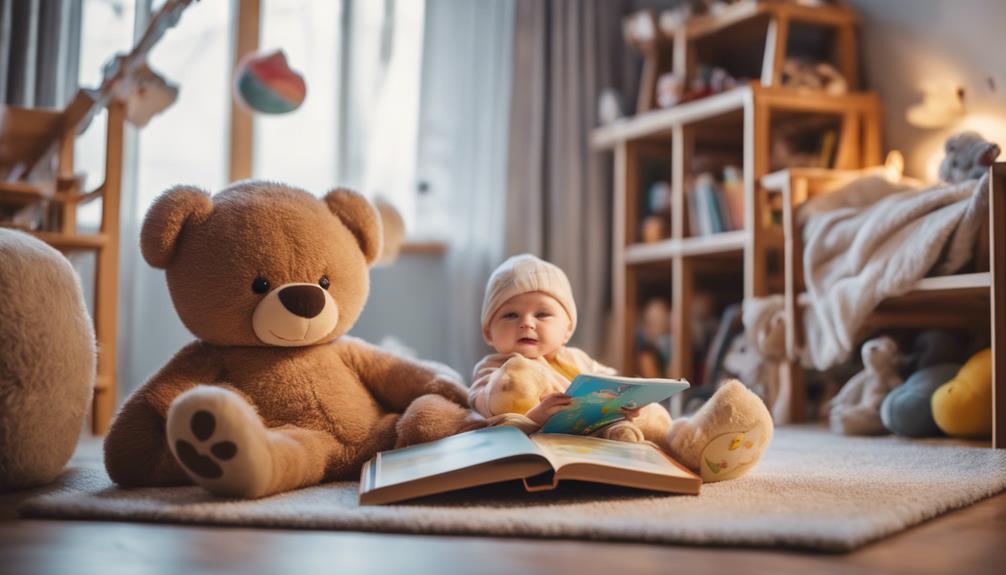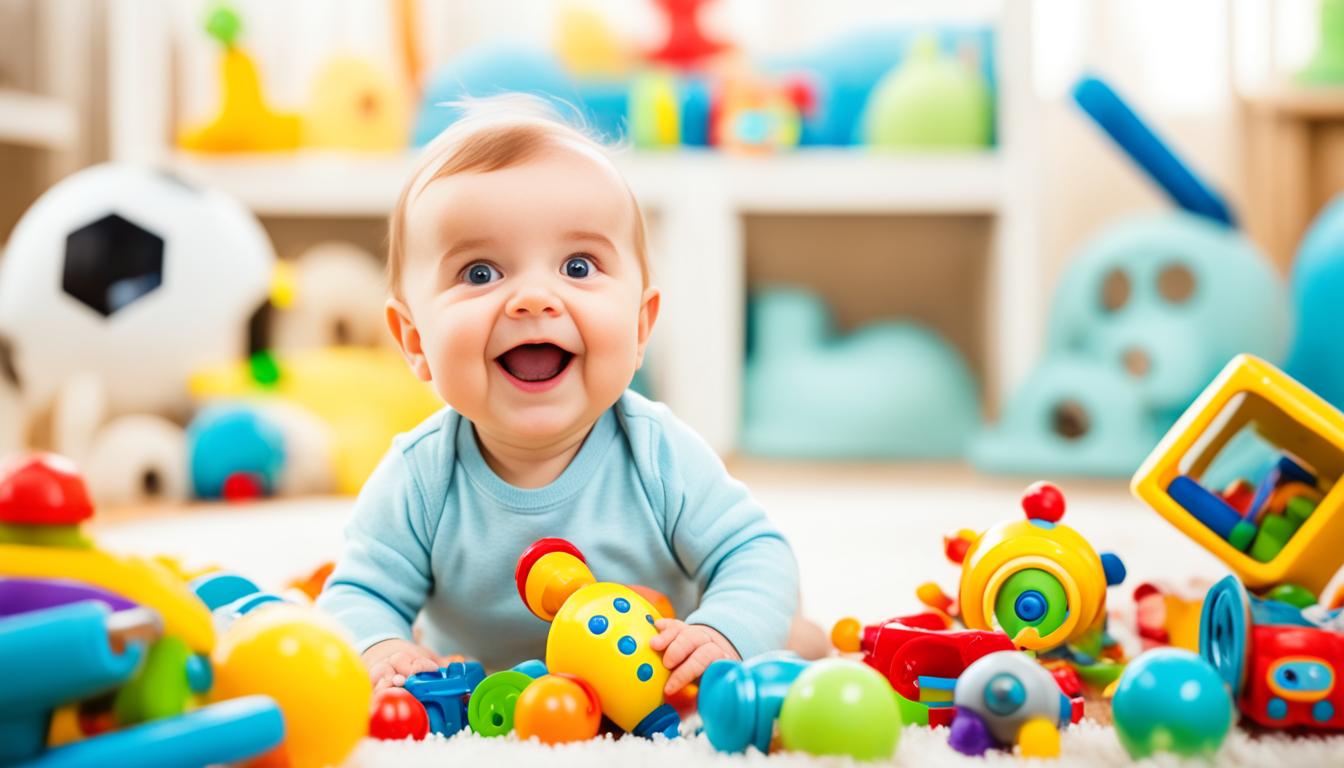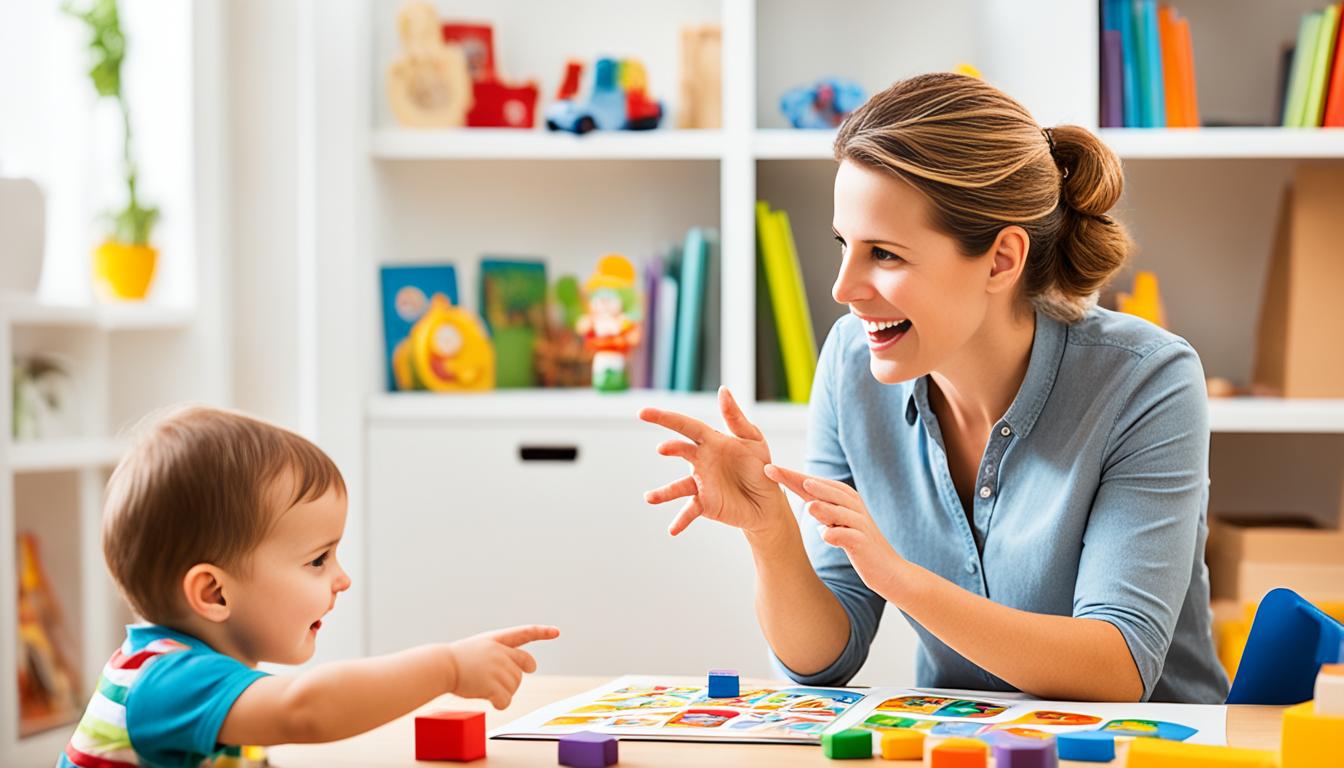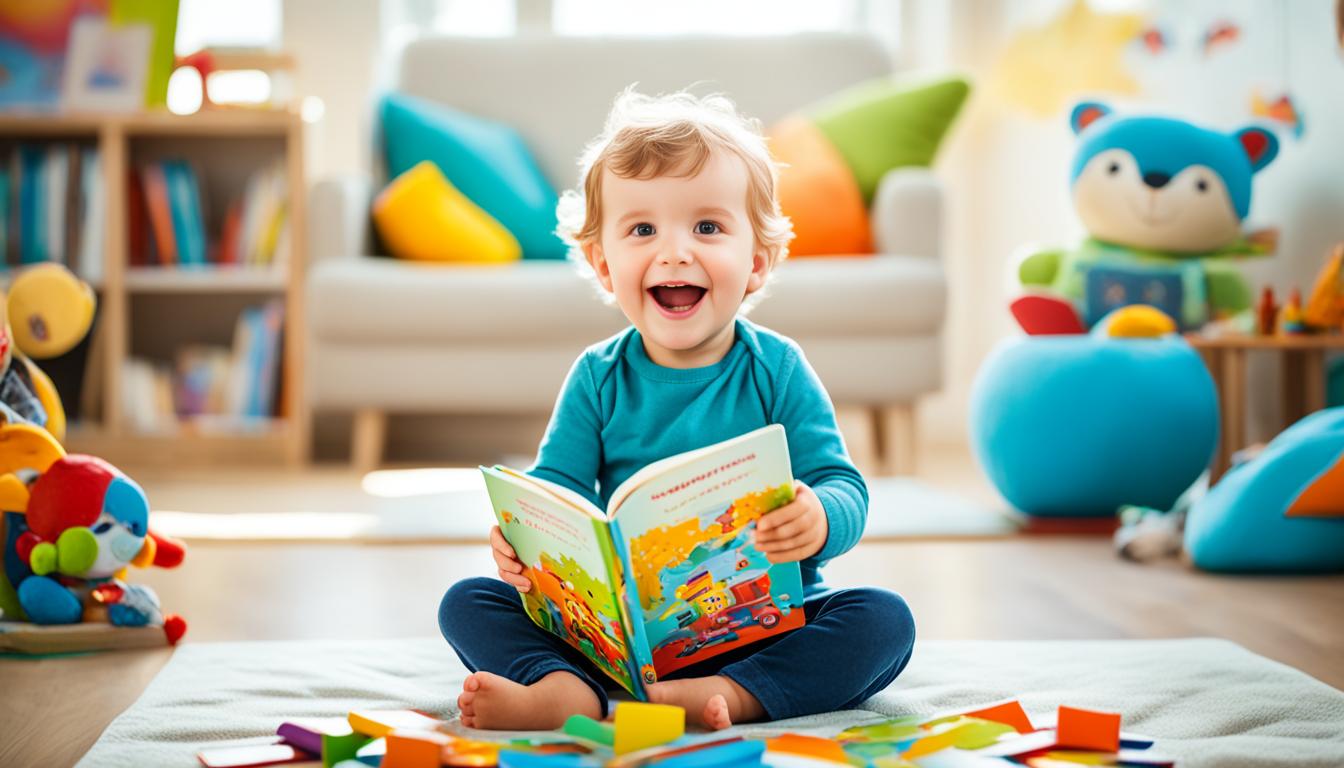Discover the complex world of baby language development by age to help promote communication skills and enhance vocabulary at key stages. From recognizing sounds to babbling with specific sounds, infants make strides in language from birth to 6 months. Differentiating syllables and saying first words typically happen at 4-6 months and 12 months, respectively. Around 19-20 months, a language explosion occurs with quick word learning. Encouraging gestures, labeling objects, and reading to toddlers can improve their vocabulary. Helping toddlers form two-word phrases can significantly improve their language abilities. Recognizing and supporting these milestones lays the groundwork for future language skills.
Key Takeaways
- By 2 years old, babies typically know around 50 words, including simple nouns, verbs, and adjectives.
- Around 18 months, babies start using gestures and simple words like "mama" and "dada."
- At 12 months, babies usually have a vocabulary of 2-6 words and can understand simple commands.
- By 18 months, babies can have a vocabulary of 50-100 words and start combining words into simple phrases.
- By 24 months, babies may have a vocabulary of 200-300 words and begin using basic sentences.
Birth to 6 Months
During the first six months of life, babies begin to associate sounds with sources and primarily communicate through crying. At around 4 weeks, they can already differentiate between similar syllables, an essential step in their language development. By 2 months, babies start associating sounds with lip movements, enhancing their understanding of verbal communication.
As they progress, babbling becomes a prominent feature, replacing sighs with sounds like g, k, m, w, p, and b. Around 4.5 months, infants reach a milestone by recognizing their name, a significant achievement in their cognitive abilities. By 6 months, babies not only recognize familiar words like their name but also understand that it refers to them specifically.
This period sets the foundation for future language acquisition and social interaction. Through their communication efforts, especially crying and early babbling, babies establish the basics of language recognition and understanding, paving the way for more complex linguistic skills as they grow.
7 to 12 Months
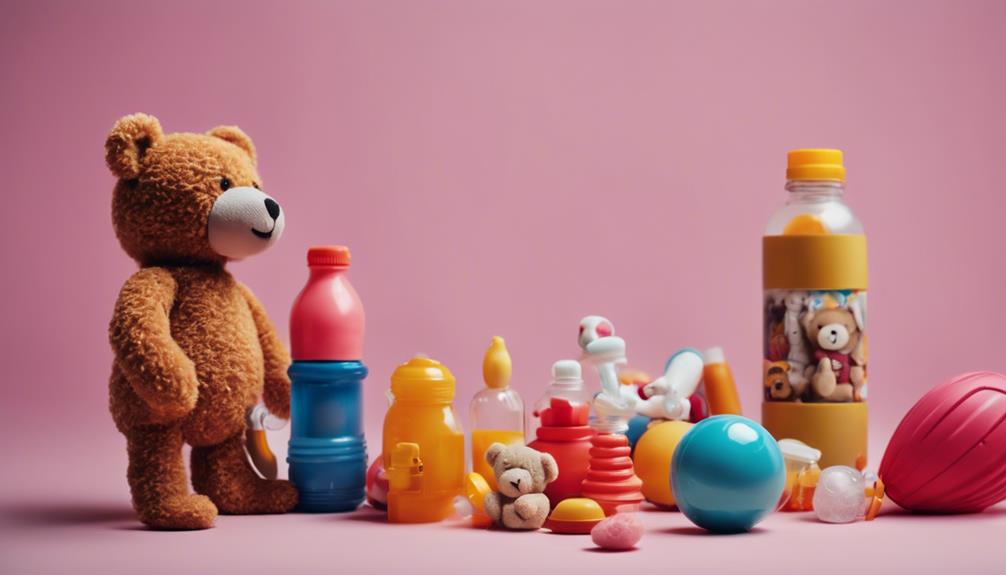
Around 7 months, babies typically show increased interest in exploring new sounds and words as their language development progresses from birth to 12 months. At this stage, infants start to comprehend simple words and may even attempt to mimic them. They begin to follow simple instructions and respond to familiar sounds and names. By the time a baby reaches 12 months, they usually utter their first words, which are often basic and essential for their communication. Below is a table summarizing key milestones in a child's language development up to 12 months:
| Milestone | Description |
|---|---|
| Recognize own name | Babies around 4.5 months can recognize their own name. |
| Understanding name | By 6 months, babies understand that their name refers to them. |
| Babbling development | Babbling starts replacing sighs between 4 to 6 months. |
| Emerging sounds | Sounds like g, k, m, w, p, and b become more prominent between 4 to 6 months. |
13 to 18 Months
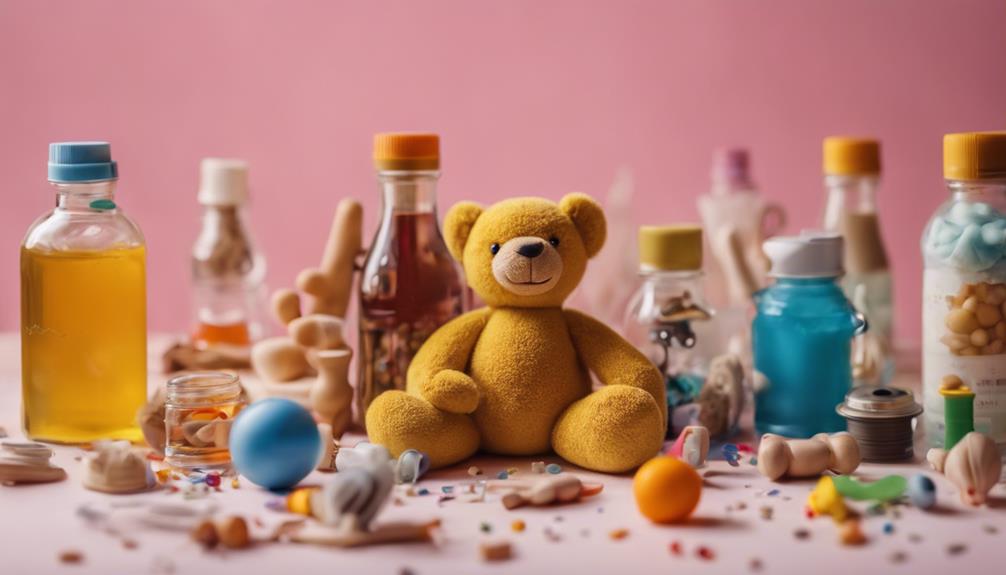
By 18 months, your little one's vocabulary is expanding rapidly, with them typically saying around 50 words and beginning to form simple phrases. This stage marks a significant milestone in their language development journey.
As a parent, you can support their growth by engaging in conversations, reading together, and introducing new words regularly.
Language Development Milestones
As your baby progresses through the first 18 months, they reach significant language development milestones. Around 4-6 months old, your child begins babbling, forming sounds like g, k, and m, evolving from simple sighs.
By the time they reach 12 months, toddlers can typically say a few words, imitate voices, respond to simple instructions, and recognize familiar objects. However, the most significant development occurs around 18 months when toddlers experience a language explosion.
During this period, they rapidly acquire new words and start stringing them together to form basic sentences. Additionally, toddlers at this age start understanding gestures like pointing, experimenting with one-word questions, and following two-part requests. This marks a critical phase in their speech and language development journey.
Vocabulary Expansion Tips
To expand your child's vocabulary up to 18 months, focus on introducing new words gradually through daily interactions and routines. Importance plays a significant role in reinforcing these new words.
Label objects during playtime, mealtime, and other activities to help your child learn and remember them. Pointing out objects in the environment and describing them can also aid in vocabulary development. For instance, during a walk, you could say, 'Look at the big tree' or 'There's a colorful flower.'
Additionally, reading books with colorful pictures and naming objects on the pages can be an effective way to expand your child's vocabulary. Encourage your child to repeat the new words after you, reinforcing their learning.
Communication Strategies
Enhance your baby's communication skills up to 18 months by implementing engaging strategies during daily interactions and playtime.
At 7-12 months, babies start babbling sounds resembling words and understand gestures like pointing. Encourage this by responding to their babbles as if having a conversation.
As they reach 12 months, babies utter their first words and engage in intentional sound repetition. Encourage this by repeating words back to them.
During 13-18 months, vocabulary expansion may seem slow, but babies exhibit a preference for nouns and basic grammar understanding. Foster this by labeling objects and narrating daily activities.
Around 18 months, toddlers begin experimenting with one-word questions and comprehending simple instructions. Support this phase by asking simple questions and giving clear, concise directions.
19 to 24 Months
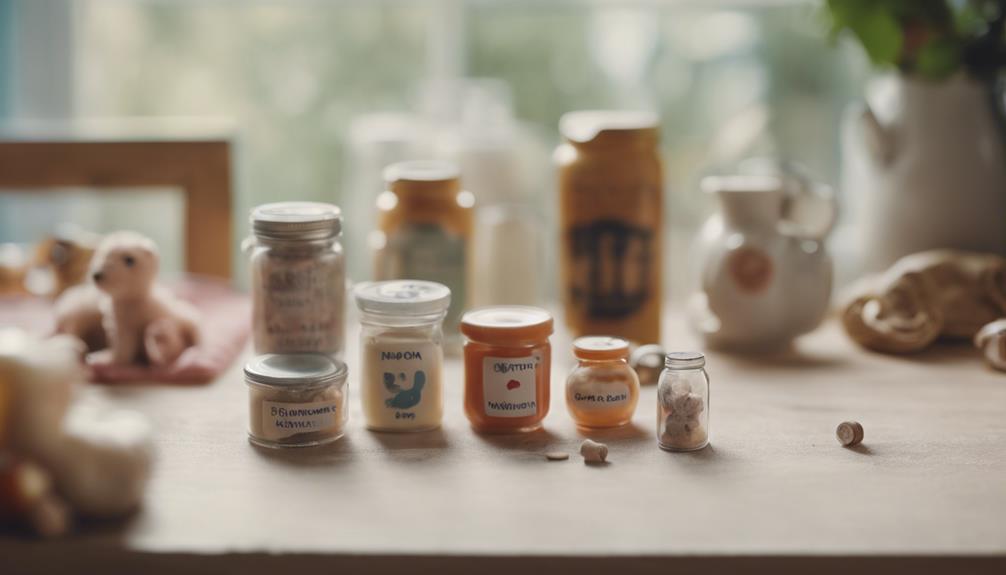
Around 24 months, babies experience a significant boost in their vocabulary acquisition, marked by a language explosion and the emergence of simple sentences. During this period, toddlers start stringing words together to form basic sentences as they explore their linguistic abilities.
This language explosion is an important milestone in their development, showcasing their growing comprehension and communication skills. Babies at this age may also make adorable language errors as they experiment with new words and sounds. Their understanding of verbs and language cues improves, enabling them to express themselves more clearly.
This phase sets the foundation for toddlers to enhance their language skills further and engage in more complex forms of communication in the future. It's a fascinating time as parents witness their little ones' rapid progress in language development, paving the way for more advanced linguistic capabilities as they continue to grow.
25 to 30 Months
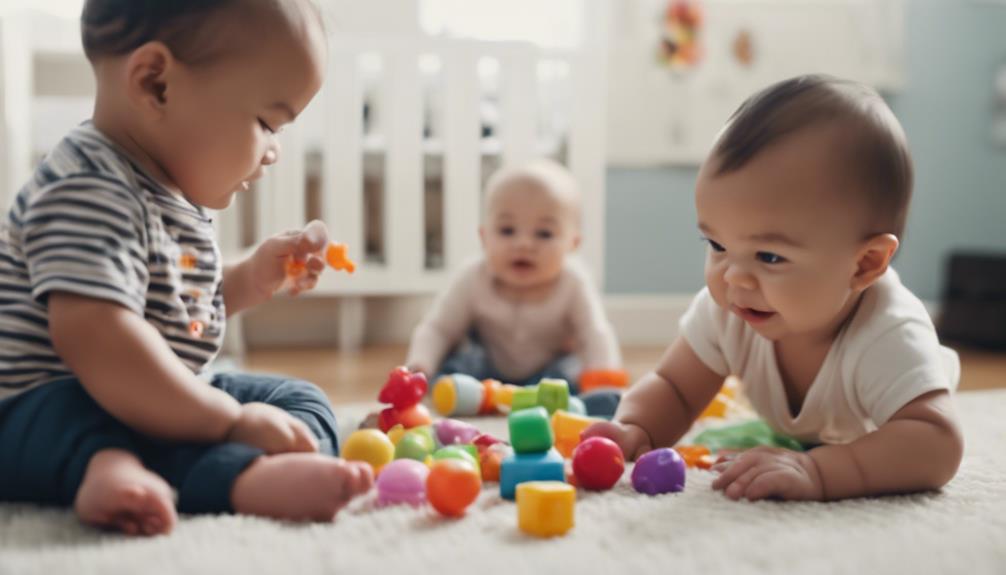
By 30 months, toddlers have typically expanded their vocabulary to around 450 words, allowing them to express themselves through short sentences and simple questions.
At this stage, language development milestones become more apparent, as toddlers grasp more complex language structures and demonstrate an increased ability to communicate their needs effectively.
Encouraging speech skills and implementing vocabulary expansion strategies play pivotal roles in supporting toddlers' linguistic growth during this period.
Language Development Milestones
Babies begin vocalizing with gurgles and long vowel sounds, progressing to distinguish between similar syllables by the age of 6 months. As your child's language skills develop, around their first birthday, they'll start saying their first words and understanding simple gestures like pointing.
During the second year, speech development ramps up, and they begin putting words together to form two-word phrases. By the time they reach 19-24 months, you might notice a language explosion happening, with your child rapidly acquiring new words and starting to form sentences.
Moving into the second year, typically around 2 years old, children expand their vocabulary even further, knowing around 25 words, using pronouns, and being able to identify common objects. By 30 months, toddlers can string words together to form more complex sentences, understand verbs, and follow simple instructions.
It's fascinating to witness this progression in your child's language abilities as they grow and learn.
Vocabulary Expansion Strategies
To expand your toddler's vocabulary up to 30 months, focus on implementing various strategies that promote language development and word acquisition. Here are some tips to help babies enhance their vocabulary:
- Encourage two-word phrases:
Encouraging toddlers to use two-word phrases by 24 months can greatly boost their vocabulary and help them improve their sentence structure.
- Reading to toddlers:
Reading to toddlers regularly is a powerful tool for vocabulary expansion. It exposes them to new words and helps them understand language in different contexts.
- Provide a language-rich environment:
Creating a language-rich environment with descriptive language and engaging conversations can aid in vocabulary expansion. Describing objects, actions, and feelings can introduce toddlers to a wide range of vocabulary.
- Engage in naming activities:
Engaging toddlers in activities that involve naming objects, actions, and feelings can further enhance their vocabulary growth. Encourage them to label things they see and express their emotions to build a robust vocabulary foundation.
Encouraging Speech Skills
Encouraging your child's speech skills up to 30 months involves consistent interaction and exposure to language-rich environments. By engaging your baby in conversations, reading books together, and labeling objects in their surroundings, you can help them learn new words and phrases. Encouraging their speech development includes repeating words, expanding on their utterances, and providing opportunities for them to practice speaking.
To support your baby's speech development, create a supportive and encouraging atmosphere where they feel comfortable expressing themselves. Respond positively to their attempts at communication, even if their words aren't perfectly articulated. Encourage them to use gestures, facial expressions, and sounds to convey their thoughts.
As your baby progresses through different stages of speech development, continue to expose them to a variety of language experiences. Play games that involve naming objects, singing songs, and reciting nursery rhymes to further enhance their vocabulary and language skills.
3 Years
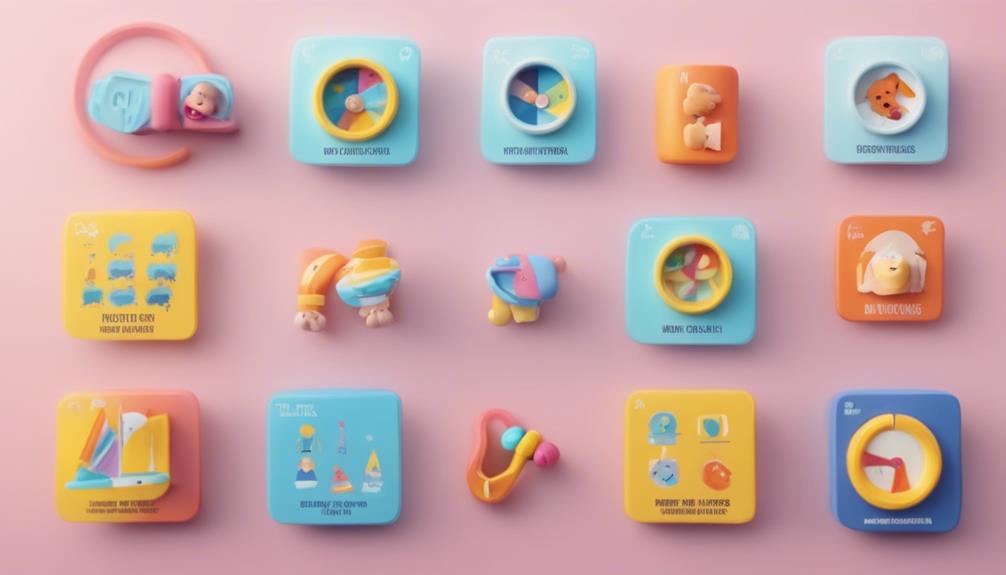
During the early years of a child's life, their vocabulary and language skills develop rapidly. Around 12 months, your child can say their first words, which is an exciting milestone in their language development.
To enhance a child's language, it's important to engage in activities that support this growth. Here are some key points to keep in mind:
- By 2 years old, children typically know around 25 words and start linking words together to form simple sentences.
- At 3 years old, children can speak in simple sentences, string words together, and follow two-part requests.
- By 4 years old, children can speak in complex sentences, identify colors, shapes, letters, and understand basic time concepts.
- Language development progresses rapidly in the early years, with children expanding their vocabulary and communication skills.
Monitoring your child's language milestones is vital to make sure they're progressing appropriately. By understanding what to expect at each age, you can support your child's language development effectively.
4 to 5 Years
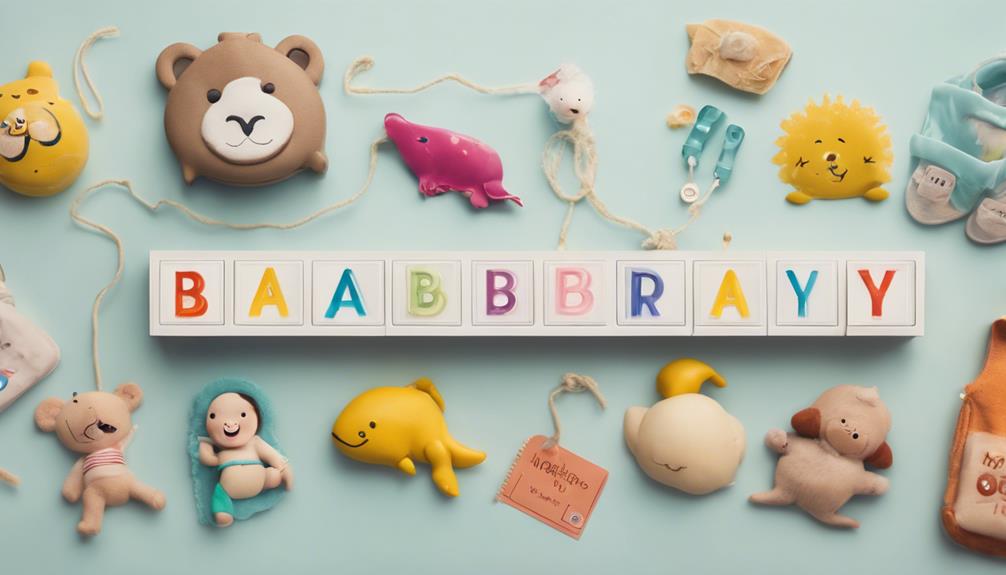
How does a child's vocabulary progress from age 2 to 5 years?
At around age 2, babies begin to form words and can understand basic nouns, verbs, and adjectives.
As children learn to communicate, their vocabulary expands rapidly. By age 3, kids typically have around 1,000 words in their repertoire and start constructing more complex sentences.
Moving towards age 4, children become able to grasp concepts like time, colors, shapes, and letters, incorporating them into their speech.
As they reach 5 years old, their vocabulary continues to grow, allowing them to engage in more detailed and meaningful conversations.
This progression in language development during the early years sets the stage for future literacy and communication skills.
Encouraging and fostering this linguistic development from a young age is essential in ensuring children build a solid foundation for effective communication and comprehension in the years to come.
Early Language Development

As your child begins the journey of early language development, they'll achieve significant milestones in babbling, progressing from simple sounds to more complex vocalizations.
Gestures play a crucial role in communication, helping to convey meaning alongside spoken words.
Through interactive play experiences, children not only build their vocabulary but also enhance their language skills, establishing a strong foundation for future linguistic development.
Milestones in Babbling
Around the age of 4-6 months, babies typically begin their babbling journey, replacing earlier sounds with more vocalizations as they explore different consonant-vowel combinations. This early stage of language development marks a significant milestone in a baby's journey towards developing speech skills. Here are some key points to understand about milestones in babbling:
- Babbling involves the repetition of consonant-vowel combinations like 'ba-ba' or 'ma-ma' as infants experiment with different sounds.
- By around 7-9 months, babies may engage in reduplicated babbling, where they repeat the same syllable or sound consecutively, further refining their vocal skills.
- Babbling serves as an essential precursor to speech development, allowing infants to practice articulating various sounds and syllables crucial for language acquisition.
- Milestones in babbling can vary among babies, but consistent babbling is a positive indicator of progress in language development, laying the foundation for future communication skills.
Importance of Gestures
Gestures play a significant role in early language development for babies, allowing them to communicate their needs effectively before mastering spoken language. Infants often begin using gestures like pointing and waving as their initial tools for communication. These non-verbal cues serve as a bridge between their thoughts and the outside world, enabling them to express desires and feelings.
Research indicates that babies who incorporate more gestures into their communication tend to develop larger vocabularies as they grow. By encouraging gestures in infants, caregivers can actively support their language development and comprehension skills. These gestures not only help babies convey basic needs but also aid in building a foundation for future verbal communication.
It's through these early gestures that infants begin to understand the connection between non-verbal cues and spoken language, laying the groundwork for a more robust vocabulary in the future.
Building Vocabulary Through Play
Engaging in play activities is a fundamental method for enhancing vocabulary development in young children. Through interactive play, kids not only have fun but also learn new words in context, which aids in their language and communication skills.
Pretend play, like playing house or imagining adventures, is particularly beneficial for vocabulary acquisition as children use a variety of words to describe their make-believe scenarios. Additionally, storytelling during playtime can introduce children to new vocabulary in a creative and engaging way.
To further support vocabulary growth, incorporating toys, books, and games into play sessions can expose children to a rich language environment where they can learn and practice new words. By integrating these elements into play, parents and caregivers can create a stimulating language-learning experience that nurtures a child's linguistic development.
Language Milestones in Infants

During their early months, infants begin to associate sounds with sources and communicate primarily through crying. As they approach 4 to 6 months, babies start distinguishing between similar syllables and can recognize their name. Babbling takes over the sighs, with sounds like g, k, m, w, p, and b emerging. Around the first year, infants utter their initial words and grasp gestures like pointing. An impressive language explosion typically occurs at 19-20 months, marked by a rapid acquisition of new words and the ability to string them together into sentences.
| Developmental Stage | Milestone Achieved | Age Range |
|---|---|---|
| 4-6 Months | Distinguishing between similar syllables | 4 to 6 months |
| 6 Months | Recognizing their name | Around 6 months |
| 12 Months | Saying first words and understanding gestures | Around 12 months |
Supporting Toddler Vocabulary
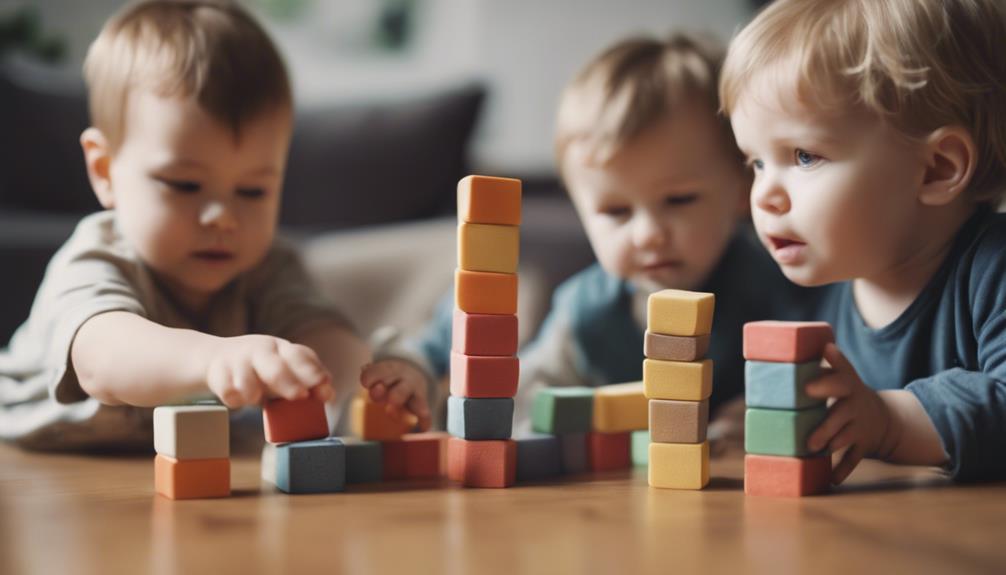
As your infant progresses into the toddler stage, supporting their vocabulary development becomes essential for their language skills growth. Here are some effective strategies to help expand your toddler's vocabulary and enhance their language skills:
- Encourage the use of gestures, pointing to objects, and labeling items to help toddlers connect words with their meanings.
- Engage in activities like reading books, singing songs, and having conversations to expose toddlers to new words and enrich their vocabulary.
- Introduce new words in context during daily routines such as mealtime or playtime to make learning more practical and meaningful for toddlers.
- Respond positively to your toddler's communication attempts, repeat new words frequently, and provide reinforcement to support their language learning journey and vocabulary growth.
Frequently Asked Questions
At What Age Should Babies Start Saying Words?
Babies typically start saying their first words around 12 months old. By 18 months, most babies should have a vocabulary of around 50 words. Remember, individual development and exposure to language play a role.
How Many Words Should a Baby Know by the Age of One?
You're not running a word marathon with your baby, but hey, around 3-5 words by one is the average. 'Mama,' 'dada,' and 'hi' are common starters. Remember, gestures count too!
What Is the Vocabulary of a Child by Age?
By age, your child's vocabulary blossoms. At 1, a handful of words; 2, around 25 words; 3, simple sentences; 4, complex sentences and basic concepts. Milestones shape their language growth, guiding them from babbling to fluent communication.
What Are the First 10 Words a Baby Learns?
Wondering what the first 10 words a baby learns are? Well, they often start with simple words like 'mama,' 'dada,' 'bye-bye,' and 'hi'. Common objects and action words like 'ball' and 'eat' follow suit.
Conclusion
As you continue to nurture your little one's language skills, remember that each new word they learn is like a tiny seed planted in the garden of their mind, ready to bloom and grow.
Keep providing a rich environment full of words, sounds, and interactions to help them flourish.
Before you know it, they'll be chatting away like a pro!
Enjoy this exciting journey of language development with your child.

